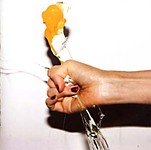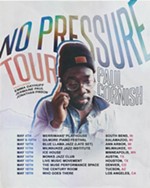The New Mechanic's Guide
Misra Records by the book
By Darcie Stevens, Fri., May 12, 2006

In 1991, Simple Machines record label founders Jenny Toomey and Kristin Thomson put out a do-it-yourself manual, the Introductory Mechanic's Guide to Putting Out Records – what to expect, where to press records, how to make them look good. It sold like saline in a strip club, more than any Simple Machines album ever did. Although the early-Nineties music explosion birthed almost as many indie labels as indie acts, Phil Waldorf, 31, didn't found Misra Records until 1999 (Austin Chronicle, Nov. 14, 2003). He did, however, release Toomey's Antidote in 2001, taking a page or two out of Guide before he even set foot out of Athens, Ga.
Things have changed since grunge. There's the Internet, or at least the proliferation of it. Napster and LimeWire, Friendster and MySpace. iTunes and blogs and Pitchfork. The landscape has been dug up and replanted, and nobody's writing new rules with any sense of finality.
Without diving into file sharing, copyright infringement, or entertainment law – important matters all – Waldorf offered some personal rules of thumb about approaching a label like his, by virtue of the fact that the Austin-based Misra is quickly becoming one of the most respected microlabels in the indie underground.
1) Hone Your Aesthetic
"Try to come up with a good visual component for your band," urges Waldorf. "You don't need stylish band photos, but don't send a demo on a blank CD with Magic Marker on it. Make it look like something without making it overbearing."
We know: Looks have nothing to do with your music, but in any media a killer visual goes a long way. When major labels became megacorporations – when payola ran wild and 15-year-old boys were all the rage – image and packaging certainly didn't hurt anyone's sales. Those burned CD-Rs will only get you so far.
There is, of course, a big difference between glitz and ambition. While black eyeliner might seem like a great idea for yet another post-punk band, a few dollars spent on one of your aspiring photographer or graphic designer friends is an investment in your creative circle. Sure, it's only a demo, but pretend it's an Internet dating-service profile. Nobody ever picks the product without a photo.
2) Play as Many Shows as You Can – Within Reason
"A live show is really important," Waldorf says. "If a band is not totally amazing the first time I see them, by no means does that mean I'm not interested. Everybody has bad shows. The idea is to be able to see through that. Do they have that charisma to connect with people, even if it's not effective at that moment? Ultimately I'm selling records and not live shows, but it's awfully hard to sell records if the band doesn't have a captivating live show."
Shoegaze nears the grave as rockers realize the importance of creating a show instead of simply playing one. That horrible band that squawks and squeals in the headlining slot might just be your ticket out of this hellhole called self-release. Networking isn't only a job-fair concept.
"Centro-matic came to me through the endorsement of other bands on the label. Shearwater I met at South by Southwest at an Okkervil River show where they gave me a CD. It was a demo, but it was a demo from somebody I was connected to. It wasn't just a dude handing me a CD on the street. If that was the case, it would've never gotten listened to," admits Waldorf. "Honestly, if you can get in the good graces of the people I trust, that's a really good way to get me to actually listen. At least it makes me take the leap."
3) Do It Yourself
"If you come to me and you've done 25% of the work already, I'm going to be impressed," he says. "It's a partnership. I'm not working for bands, and bands aren't working for me. We're working together. If you're already halfway there, it's going to go a long way to getting a label excited."
This isn't Waldorf being lazy. It's easy to forget that the music geeks running these tiny labels are doing this because they love it. Waldorf is one man at a computer in his house, sending out cyber correspondence, mailing promos, and working the phone before he goes to work at Emo's, where he books bands. He can't do everything a major label does, but what he does do carries the personal touch all the money on the planet can't fake.
Update your MySpace profile. Create a great Web site including biographical information, tour dates, and mp3s. Promote, promote, promote, and when you think you've done enough, promote some more.
"Right now, the concern shouldn't be getting signed, it should be promoting your band. The signing will come."
A day in the life of an indie-label head does not involve snobbery. These home-run businesses take other jobs subsidizing them, perseverance, and many pots of java. It's an exercise in growing, an exercise in progress, and as Shearwater, Centro-matic, and Great Lake Swimmers dive into the national pool, Phil Waldorf keeps the gears turning.
"A huge part of what I do is keeping up," he shrugs. "The way you sell records is changing at a lightning speed. It's totally different from when I started. I had a dial-up connection. I didn't have a Web site when I started my label. A lot of what I'm doing is adjusting. There is no formula, and I think maybe three years ago there was a little bit of a formula. There's a lot less of one now because there are so many different ways to get music out there.
"I'm one big record away from not having to work another job, but I've always been one big record away. Sell 30,000 copies of one record, and go ahead, quit your day job." ![]()








